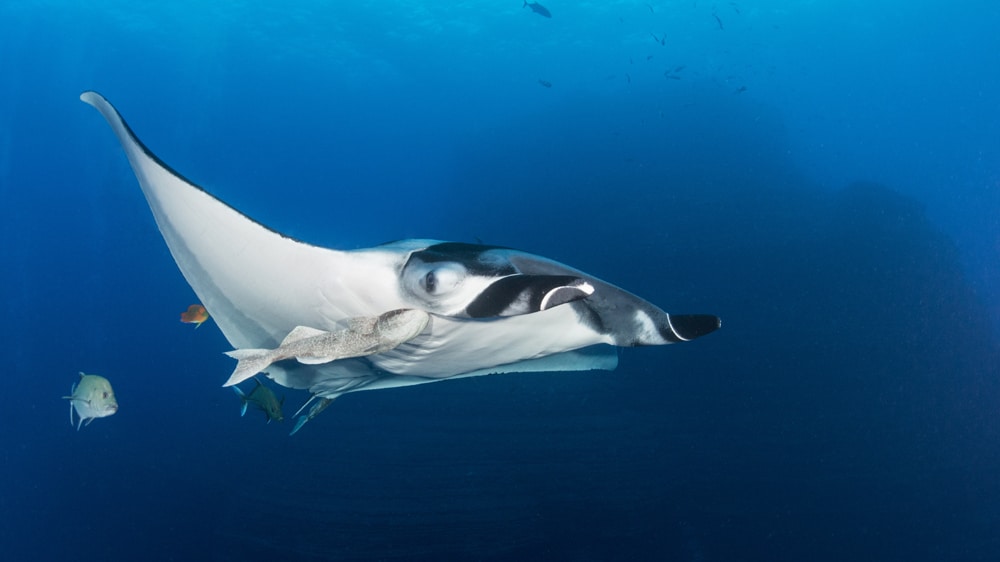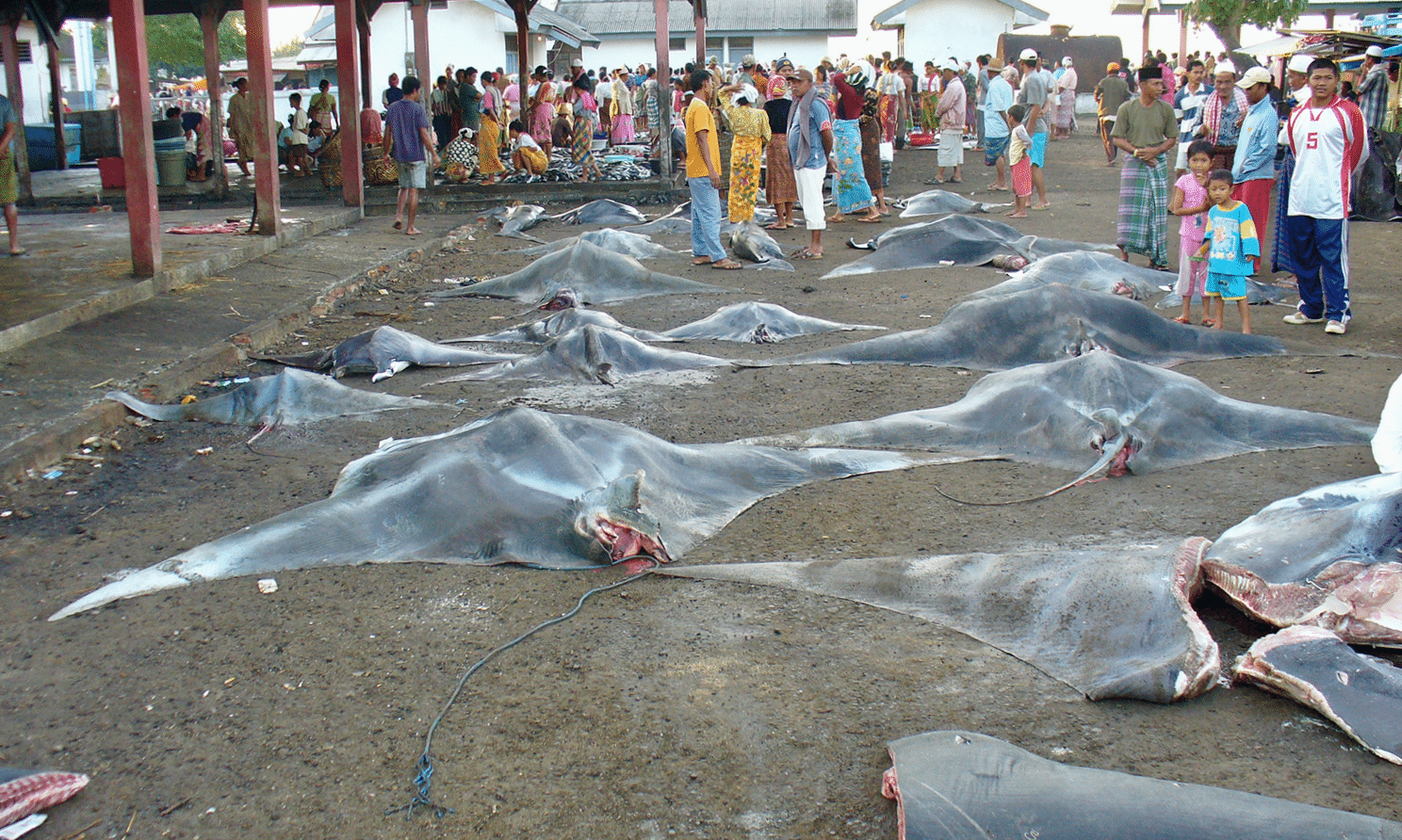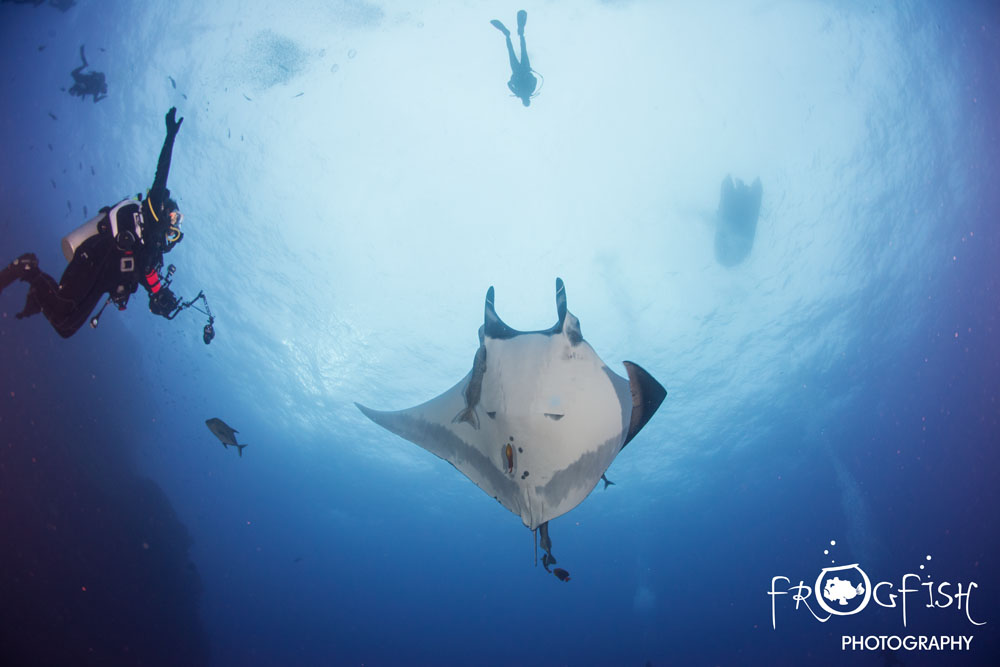Marine Life & Conservation
Giant Manta listed as Endangered

 The conservation status of the giant (or oceanic) manta ray (Mobula birostris) has been uplisted today to Endangered on the International Union for the Conservation of Nature (IUCN) Red List of Threatened Species. An endangered listing is reserved for species with grave conservation concerns. Today’s announcement serves to confirm what we have long suspected – this gentle marine giant is finding it hard to cope with intensifying anthropogenic pressures around the globe. The giant manta ray now joins over 16,000 endangered species to be assessed with this serious threat level. At this stage, 30% of sharks and rays are now threatened with extinction.
The conservation status of the giant (or oceanic) manta ray (Mobula birostris) has been uplisted today to Endangered on the International Union for the Conservation of Nature (IUCN) Red List of Threatened Species. An endangered listing is reserved for species with grave conservation concerns. Today’s announcement serves to confirm what we have long suspected – this gentle marine giant is finding it hard to cope with intensifying anthropogenic pressures around the globe. The giant manta ray now joins over 16,000 endangered species to be assessed with this serious threat level. At this stage, 30% of sharks and rays are now threatened with extinction.
The announcement marks the end of a devastating two decades for this species. Targeted for their gill plates – which they use to filter feed on small zooplankton from the water column – the unrelenting and increasing demand for their body parts has fueled both existing and emerging target fisheries. The relatively new Asian-based trade seems to be impacting the giant manta more than other species of manta ray, with the unsustainable harvesting decimating their populations across the globe.
Dr. Andrea Marshall, co-founder of the Marine Megafauna Foundation (MMF), who lead-authored this newest assessment for the IUCN, has been involved in their assessments since 2003. “The giant manta ray is a classic example of a species that is quickly succumbing to human-induced pressures. When we first assessed manta rays in 2003 there simply was not enough information on the species to determine their conservation status and they were listed as ‘Data Deficient’, but on each of the subsequent assessments, their conservation status increased steadily from Near-Threatened, to Vulnerable and now to Endangered. Their current status is a direct result of unsustainable pressure from fishing, which now threatens to destabilize their populations across the globe.”
To curb the burgeoning trade in their body parts to Asia and to encourage more comprehensive conservation strategies for their populations around the world, the giant manta ray was listed on two of the most important global conservation treaties, the Convention on Migratory Species (CMS) in 2011 and the Convention on the International Trade in Endangered Species (CITES) in 2013.
Sadly, their numbers have continued to decline. “Manta rays simply cannot withstand such pressures on their populations,” Dr. Marshall explains. “They have an extremely conservative reproductive strategy. They reach sexual maturity relatively late in life, they give birth to a single offspring every few years in the wild, they do not look after or defend their young and the offspring themselves are vulnerable when they are small and may not survive. In other words, as a species, they simply cannot reproduce fast enough to build back their numbers once they are depleted.”
This iconic species is not only extremely important from an ecological perspective, giant mantas also provide vast economic benefits to tourism industries around the world. “Interactions with manta rays are highly sought after by dive and snorkel tourists globally and contribute millions of dollars to tourism economies each year, particularly in developing nations. At this pivotal time, recognizing their economic value may help to encourage the protection of this enigmatic and now endangered species” explained Dr. Stephanie Venables, a Senior Scientist and manta ray expert at MMF.
The giant manta ray was only formally described (the process of gathering enough scientific evidence to provide a taxonomic description of a newly discovered species) by Dr. Marshall and colleagues in 2009. At the time it was one of the largest species to be described in our oceans and the announcement was met with excitement around the globe. The discovery was covered by the BBC that year in the first-ever documentary on manta rays.
“It is such an honor to have been able to study and describe this species. The realization that the giant manta ray is now in danger of extinction is a hard pill to swallow”, Dr. Marshall admits. “We are still busy learning about this extraordinary creature and we have only scratched the surface. There is so much more we need to understand, but at this stage, we have put that all aside in favor of protecting the last remaining populations of giant mantas across the globe.”
For more information on the work of the Marine Megafauna Foundation visit their website by clicking here.
Marine Life & Conservation
Paul Watson Released as Denmark Blocks Japan’s Extradition Bid

Renowned anti-whaling activist Paul Watson has been released from custody in Greenland after spending five months in detention. Denmark’s Justice Ministry rejected Japan’s request for his extradition, citing insufficient guarantees that his time already served in custody would be credited against any potential sentence.
The 74-year-old Canadian-American was arrested on July 21 in Nuuk, Greenland’s capital, when his ship docked to refuel. His arrest was based on a 2012 Japanese warrant related to a 2010 encounter in Antarctic waters. Japan alleged Watson obstructed operations and caused damage to a whaling research ship during efforts to disrupt illegal whaling. Watson has consistently denied these claims, maintaining his commitment to marine conservation.
Denmark, which oversees extradition matters for Greenland, concluded that while the legal conditions for extradition were met, the lack of assurances from Japan regarding time-served credit made extradition untenable.
In a video shared by his foundation, Watson expressed gratitude and relief, saying, “After five months, it’s good to be out… and good to know they’re not sending me to Japan.” He added that the most difficult part of his time in custody was being separated from his two young sons.
Watson is a pioneering figure in marine conservation, known for founding the Captain Paul Watson Foundation in 2022 after decades of activism with the Sea Shepherd Conservation Society. His bold efforts to defend marine life have earned him widespread support, including from celebrities and conservationists. His work has also been featured in the acclaimed reality TV series Whale Wars.
Watson’s lawyer, Jonas Christoffersen, praised the decision, stating, “We are happy and relieved that Paul Watson is now free.” He added that Watson is eager to reunite with his family and continue his vital work.
The arrest occurred while Watson’s vessel, the M/Y John Paul DeJoria, was en route to the North Pacific with a team of 26 volunteers to intercept a Japanese whaling ship. His foundation described the arrest as politically motivated and emphasized that Watson’s actions were focused on ending illegal whaling practices.
Japan resumed commercial whaling in 2019 after leaving the International Whaling Commission, asserting that whale meat is a cultural tradition. Conservationists, however, continue to challenge these practices, highlighting their impact on marine ecosystems.
Despite the challenges, Watson remains steadfast in his mission to protect marine life and bring attention to whaling practices. His dedication to ocean conservation has made him a globally respected advocate for the environment.
Marine Life & Conservation
12 Days of Zero-Waste Fish-mas

This holiday period, the Marine Conservation Society, the UK’s leading ocean membership charity, invites you to make some simple changes to eating fish this Christmas to help our seas.
Dr Kenneth Bodles, Head of Fisheries and Aquaculture at the Marine Conservation Society, said, “During the festive season, our consumption increases, but so does waste. Sustainability isn’t just about where food comes from – it’s also about how you use it. By reducing waste and making the most out of your seafood, you’re not only taking steps to be more ocean-friendly, but can also help to cut costs during what is often one of the most expensive times of the year”.
The Marine Conservation Society has compiled twelve tips on how to consume seafood sustainably with zero-waste this Christmas:
Buy whole fish instead of fillets
Instead of fillets, consider buying whole fish such as salmon, hake, or lemon sole. By adopting a “nose to tail” approach with cooking, whole-baked fish not only feeds a crowd, but also helps to minimise waste and maximise sustainability by using up every part of the animal, including bones, skin, and fat.
Make fish stock
Leftover fish bones or shells can be put to good use by boiling them to make a nourishing fish stock or bisque. This can be frozen and preserved for later use and makes for a flavourful base in a soup.
Make your own fish pâté
Avoid waste by turning leftover fish, such as smoked mackerel or salmon, into a delicious pâté by blending with cream cheese and lemon. Perfect when paired with crackers.
The sustainability of salmon and mackerel varies depending on where and how it is caught or farmed. For more information on green-rated options, check the charity’s Good Fish Guide.
Buy frozen
By purchasing seafood that is frozen or vacuum-packed, this helps to reduce waste by extending the shelf life of your food.
Fish pie
If you’re wondering what to do with leftover cooked fish, why not opt for a classic fish pie with mashed potatoes, leeks, and a cheesy sauce? A sure crowd pleaser on Boxing Day.
Use the head
Don’t forget the fish head! The meat is incredibly tender and flavourful. The charity recommends a cod’s head curry or recreating Fallow’s renowned cod’s head in siracha butter.
By stretching your ingredients further, not only is this a more sustainable way to enjoy seafood, but also cost-effective by repurposing leftovers and cooking creatively.
Boxing Day brunch
Mix leftover kippers or smoked salmon with scrambled eggs for a tasty, zero-waste, Boxing Day brunch.
For best choice, make sure you buy kippers, or herring, from the North Sea and the North Irish Sea.
Zero-waste storage
A top tip from the Marine Conservation Society to avoid waste is freezing fish offcuts to save for future use.
Crisp up the skin
Even leftover fish skin can be turned into a quick savoury snack by crisping it up in an air fryer with a little olive oil and salt.
Anchovies two ways
Leftover anchovies can either be blended with butter to make a delicious anchovy butter or tossed into pasta for a hit of umami flavour.
The charity recommends opting for anchovies caught in the Bay of Biscay for best choice.
Fishcakes
For an easy, zero-waste meal, leftover seafood trimmings can be mixed with mash and fried in breadcrumbs to make fishcakes.
Pickled mussels
Try pickling mussels in 1:1 vinegar and water, with a dash of sugar for a sustainable, zero-waste snack that can be enjoyed well beyond the festive season.
Mussels farmed in the UK are a seafood superhero. Grown using low-impact methods and harvested by hand, they get all the food they need from the sea around them. This makes them one of the most sustainable, ocean-friendly, and cost-effective seafood options.
Players of People’s Postcode Lottery have raised £6.6M towards the Marine Conservation Society’s vital work in making seafood more sustainable.
Laura Chow, Head of Charities at People’s Postcode Lottery, said: “Fish is a festive favourite for many, but making sustainable choices when it comes to how we buy and eat seafood makes all the difference for our ocean. Support from players of People’s Postcode Lottery has helped the Marine Conservation Society further its sustainable seafood work, so that we can all enjoy healthier, better protected seas.”
The Marine Conservation Society encourages you to make sustainable seafood choices a year-round habit, not just for Christmas. To check how sustainable the seafood on your plate is, you can visit the charity’s Good Fish Guide. The Guide helps consumers and businesses identify the most sustainable seafood using a simple traffic light system, based on where and how species are caught or farmed. Green is the best choice, amber means improvements are needed, and red indicates fish to avoid buying.
Zero-waste gift idea
Why not embrace a zero-waste Christmas by gifting a membership to support marine conservation? It’s a meaningful, low-waste gift that helps protect our ocean for generations to come. Memberships start from as little as £5 a month – the price of a sandwich and drink from your local coffee shop.
Find the latest sustainable seafood advice for wild-caught and farmed seafood on the Good Fish Guide, downloadable to your phone from www.mcsuk.org/goodfishguide.
-

 News2 months ago
News2 months agoIconic SS United States to become the World’s Largest Artificial Reef
-

 News3 months ago
News3 months agoBook Review – 52 Assignments: Underwater Photography
-

 Gear News3 months ago
Gear News3 months agoDYNAMICNORD – New German diving brand enters the British market
-

 News3 months ago
News3 months agoExploring Cenote El Pit: A Diver’s Dream
-

 Gear News3 months ago
Gear News3 months agoTry BARE drysuits (and maybe even win one!) this Friday with Sea & Sea at North West Dive Fest
-

 Marine Life & Conservation3 months ago
Marine Life & Conservation3 months agoBook Review: Coral Triangle Cameos
-

 Blogs2 months ago
Blogs2 months agoDive the Egyptian Red Sea this Autumn with Regaldive
-

 News3 months ago
News3 months ago2024 Ocean Art Underwater Photo Competition Announced

















